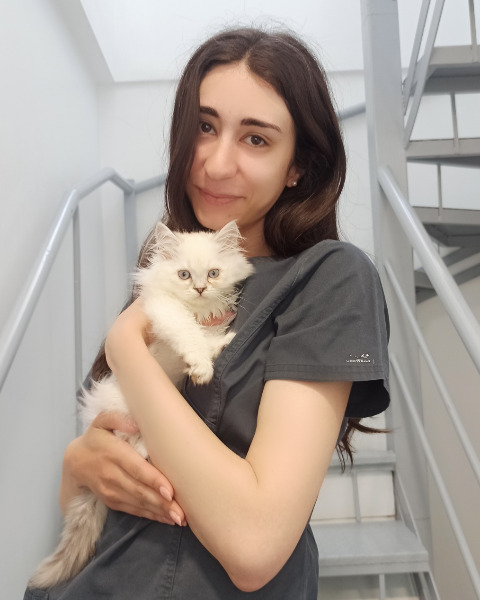Small Animal Internal Medicine
In Person Only
GI06 - Serum Cobalamin and Folate Concentrations, Dysbiosis Index, and Histopathological Findings in Cats with Chronic Enteropathy
Friday, June 7, 2024
8:00am - 8:15am CT
Location: MCC 103 F
CE: 0.25

Katerina T. Moraiti, DVM, PhD candidate (she/her/hers)
PhD Candidate
University of Thessaly
Karditsa, Kardhitsa, Greece
Research Abstract - Oral Presenter(s)
Abstract: Background- Changes in serum cobalamin and folate concentrations are common in cats with chronic enteropathy (CE).Hypothesis/Objectives- Τo evaluate the association between serum cobalamin and folate with histopathological findings (HF), duration of clinical signs (CS) and dysbiosis index (DI) in cats with CE.Animals- Sixty-two cats with CE. Methods- All cats underwent upper and lower endoscopy and biopsies were collected for histopathology. Serum cobalamin and folate, and fecal DI were measured in all cats. Results- Twenty-four of 62 (39%) cats had hypocobalaminemia. Serum cobalamin in cats with small cell lymphoma (SCL) (median: 272ng/L) was significantly lower than in cats with chronic inflammatory enteropathy (CIE) (median: 913.4ng/L; p=0.0143). There was no significant difference in serum cobalamin between cats with mild or severe HF in the ileum (p=0.96), or with an overall HF that was mild or severe (p=0.09). However, serum cobalamin was significantly lower in cats with severe HF compared to those with mild HF in the duodenum (p=0.01). There was a significant weak correlation between serum cobalamin and DI (r=-0.3; p=0.04) and 29/51 (57%) cats had dysbiosis (DI>0). Eleven of 62 (18%) cats had decreased (21.6ng/L) serum folate. There was a significant weak correlation between serum folate and duration of CS (r=0.3; p=0.003). Conclusions and clinical importance- Hypocobalaminemia was associated with more severe HF in the duodenum but not in ileum (where it is believed to be absorbed) and was negatively correlated with dysbiosis. Increased serum folate was associated with increased duration of CS.

